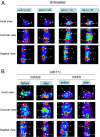mTOR and HIF-1alpha-mediated tumor metabolism in an LKB1 mouse model of Peutz-Jeghers syndrome
- PMID: 19541609
- PMCID: PMC2708689
- DOI: 10.1073/pnas.0900465106
mTOR and HIF-1alpha-mediated tumor metabolism in an LKB1 mouse model of Peutz-Jeghers syndrome
Abstract
Peutz-Jeghers syndrome (PJS) is a familial cancer disorder due to inherited loss of function mutations in the LKB1/ STK11 serine/threonine kinase. PJS patients develop gastrointestinal hamartomas with 100% penetrance often in the second decade of life, and demonstrate an increased predisposition toward the development of a number of additional malignancies. Among mitogenic signaling pathways, the mammalian-target of rapamycin complex 1 (mTORC1) pathway is hyperactivated in tissues and tumors derived from LKB1-deficient mice. Consistent with a central role for mTORC1 in these tumors, rapamycin as a single agent results in a dramatic suppression of preexisting GI polyps in LKB1+/- mice. However, the key targets of mTORC1 in LKB1-deficient tumors remain unknown. We demonstrate here that these polyps, and LKB1- and AMPK-deficient mouse embryonic fibroblasts, show dramatic up-regulation of the HIF-1alpha transcription factor and its downstream transcriptional targets in an rapamycin-suppressible manner. The HIF-1alpha targets hexokinase II and Glut1 are up-regulated in these polyps, and using FDG-PET, we demonstrate that LKB1+/- mice show increased glucose utilization in focal regions of their GI tract corresponding to these gastrointestinal hamartomas. Importantly, we demonstrate that polyps from human Peutz-Jeghers patients similarly exhibit up-regulated mTORC1 signaling, HIF-1alpha, and GLUT1 levels. Furthermore, like HIF-1alpha and its target genes, the FDG-PET signal in the GI tract of these mice is abolished by rapamycin treatment. These findings suggest a number of therapeutic modalities for the treatment and detection of hamartomas in PJS patients, and potential for the screening and treatment of the 30% of sporadic human lung cancers bearing LKB1 mutations.
Conflict of interest statement
The authors declare no conflict of interest.
Figures




References
-
- Sanchez-Cespedes M, et al. Inactivation of LKB1/STK11 is a common event in adenocarcinomas of the lung. Cancer Res. 2002;62:3659–3662. - PubMed
-
- Carretero J, Medina PP, Pio R, Montuenga LM, Sanchez-Cespedes M. Novel and natural knockout lung cancer cell lines for the LKB1/STK11 tumor suppressor gene. Oncogene. 2004;23:4037–4040. - PubMed
-
- Ji H, et al. LKB1 modulates lung cancer differentiation and metastasis. Nature. 2007;448:807–810. - PubMed
-
- Hemminki A, et al. A serine/threonine kinase gene defective in Peutz-Jeghers syndrome. Nature. 1998;391:184–187. - PubMed
Publication types
MeSH terms
Substances
Grants and funding
LinkOut - more resources
Full Text Sources
Other Literature Sources
Molecular Biology Databases
Miscellaneous

